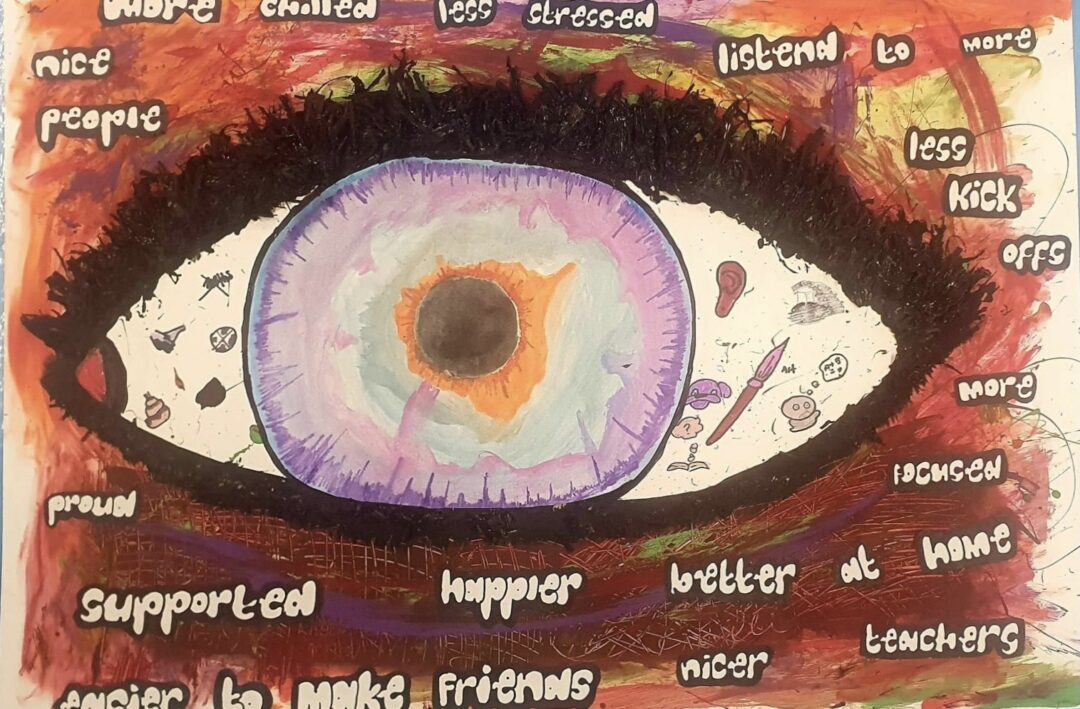EDI in action: Exploring girls’ experiences of mental health and wellbeing support in alternative education.
Blog

We worked with girls who accessed education through Pupil Referral Units and provision that supported young people’s Social, Emotional and Mental Health needs, collectively known as alternative education.
We began by carrying out interviews with the girls to allow them to talk about their experiences of alternative education. In planning the interviews, we gave the girls the opportunity to choose whether they spoke to us face to face or online, and whether they took part individually or in groups. This approach was supported by the staff who worked in alternative provision. They were invaluable in facilitating contact with the girls throughout the project and helping us to understand how best to organise activities within their provision.
We then offered the girls the opportunity to take part in arts-based activities to share their thoughts on the aspects of alternative education that they felt it was important for others to know about. The girls chose a range of mediums including drawings, mind maps, notes and photographs to share their thoughts. Interestingly, some girls chose to engage in these activities but did not want to be interviewed, which showed the value of providing young people with multiple methods for contributing to the project. We collated the artwork and, with the permission of the girls, shared this online.
Finally, we invited the girls to visit Northumbria University for a celebration lunch. During the visit, the girls had a tour of the university campus and met with some female academics who had not followed traditional routes through education but had gone on to achieve great things in their field and had taken up leadership positions within the university. This visit was important as we learnt through the research that a number of the girls had aspirations to attend university but had not visited a university campus and some would be the first in their families to attend university.
Recent national school census data shows that girls continue to be a minority group in alternative education, with boys making up around 71% of the alternative education population (National Statistics, 2023). Previous research has shown that girls can experience stereotyping, isolation and sexism in alternative education and often miss out on same-sex friendships within male dominated alternative education environments (Russell & Thompson, 2011).
This is concerning as female same-sex friendships provide support that can help to facilitate stress-reduction and coping during difficult times (Hall, 2015). This support is especially valuable across England where around 20% of young people aged 8-15 years were recently reported to have ‘a probable mental disorder’ (NHS England, 2023, para. 1).
An issue highlighted by the girls focused on the stigma associated with alternative education. They believed that people generally see alternative education as a place that young people attend due to poor behaviour, but they were keen to stress that this is not the case as alternative education supports young people with a range of needs.
Having the opportunity to hear directly from young people about their own experiences is a privilege. They are living their lives now within a context that is different to previous generations and will be different to young people’s experiences in future. However, not all young people will find it easy to share their views verbally or through face to face interaction especially when engaging with new people, so it’s important to consider this in planning research activities to maximise opportunities for young people to share their experiences if they would like to do so.
You can find more about the project, here – ‘It’s not just for naughty kids’ – Project explores girls’ experiences of alternative education settings – ARC (nihr.ac.uk)
References:
Hall, J.A. (2015). Same-sex friendships. Available at: https://www.researchgate.net/publication/314826577_Same-Sex_Friendships (Accessed 22nd December 2023).
National Statistics (2023). School, pupils and their characteristics. Academic year 2022/23. Available at: https://explore-education-statistics.service.gov.uk/find-statistics/school-pupils-and-their-characteristics (Accessed 22nd December 2023).
NHS England (2023). One in five children and young people had a probable mental disorder in 2023. Available at: https://www.england.nhs.uk/2023/11/one-in-five-children-and-young-people-had-a-probable-mental-disorder-in-2023/ (Accessed 22nd December 2023).
Russell, L. and Thompson, P. (2011). Girls and gender in alternative education provision. Ethnography and Education, 6 (3), 293-308.